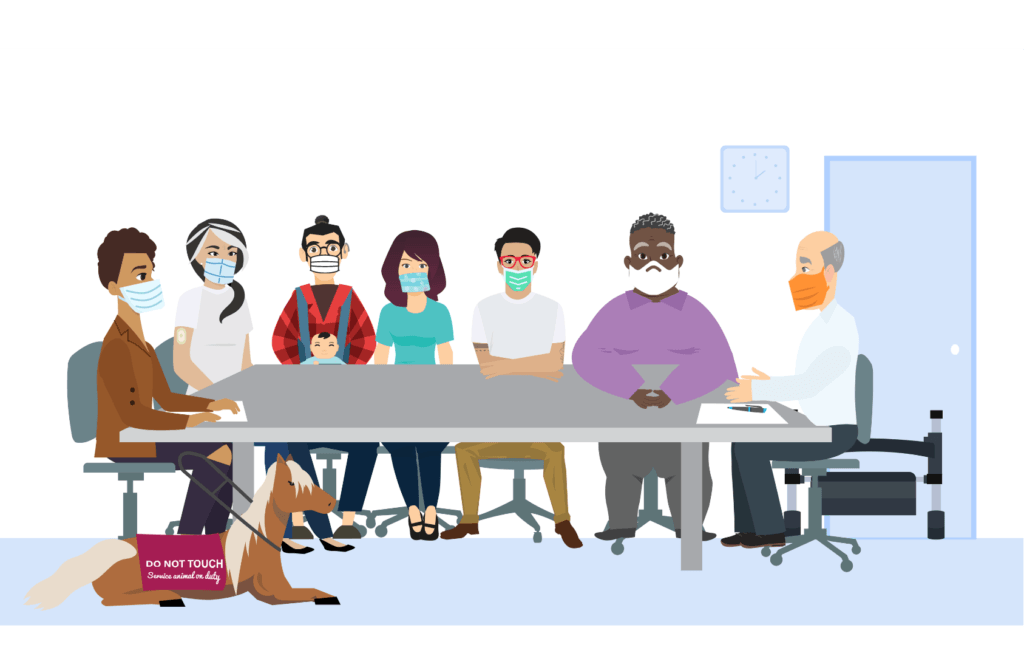The ADA: Effective Communication _review


Carrie: Local emergency management and public health departments must ensure that their communications with people with disabilities are as effective as communications with people without disabilities. Local governments are required to provide auxiliary aids and services, like closed captioning and an American Sign Language (ASL) interpreter, that promote effective communication.
With that in mind, let’s look at this policy:
Auxiliary Communication Aid Policy
When providing public emergency services, Disasterville County will provide auxiliary communication aids and accessibility services, such as American Sign Language (ASL) interpreters, upon request. The person who needs ASL interpretation will be charged a small fee to cover the interpreter’s travel costs, if any.
This policy is:
Good practice and probably in accordance with the Americans with Disabilities Act (ADA)
Actually, providing auxiliary communication aids and accessibility services, such as qualified sign language interpreters, is required to assure equal access to effective communication. No fee should be charged. Reject the policy.
Probably a violation of the Americans with Disabilities Act (ADA)
That’s right. Providing auxiliary communication aids and accessibility services, such as qualified sign language interpreters, is required to assure equal access to effective communication. No fee should be charged. Reject the policy.
Not good practice but probably in accordance with the Americans with Disabilities Act (ADA)
Actually, providing auxiliary communication aids and accessibility services, such as qualified sign language interpreters, is required to assure equal access to effective communication. No fee should be charged. Reject the policy.
Other aids and services which may be needed include:
–Written materials
-Notetakers
-Exchange of written notes
-Qualified sign language interpreters
-Assistive listening devices
-Audio recordings
-Hearing aid compatible phones
-Text messaging
-Video-based communication and interpreting systems
–Plain language materials
–Large print materials
–Qualified readers
-Braille materials
-Email
And there may be more. For example, a dry erase board may be useful for quick communication with someone who is Deaf or Hard of Hearing under certain circumstances.

PJ: If one auxiliary aid or service is an undue financial or administrative burden, the local government must use another auxiliary aid or service to provide effective communication. Remember, high cost alone usually doesn’t mean an undue burden.
? What’s the best auxiliary aid or service to use?
The most easily available one
Not quite, try again.
The least expensive one
Not quite, try again.
The person’s usual communication method
That’s right. The person’s usual communication method is best. But there may be circumstances in which that method truly isn’t available or feasible. Other factors to consider would be the communication:
– Context
– Environment
– Timeframe
– Topic
– Importance
– Length
The one recommended by a specialist
Not quite, try again.

Marco [Signing]: Accessible communication is important in emergencies. It’s important for local governments to use more than one form of communication for emergency alerts, warnings, and public education or instruction. After all, emergency management and public health offices want to make sure everyone can get the same information at the same time and is able to communicate with public health and emergency services.
? Think about situations that call for accessible communication in more than one form.
Marco’s Response [Signing]
Here are two examples:
– 911 call centers should have the technology to receive incoming calls from individuals with disabilities, who are Deaf or Hard of Hearing. Technologies include the use of video relay services and texting
– When government officials provide emergency-related information on TV, there should be real time captioning and sign language interpreters should appear in the same frame as the government officials speaking.
In general, local governments should always plan for multiple communication modalities.
Franny [Signing]: The Action Team gets a lot of questions about sign language interpreters.
Franny’s Feedback [Signing]
Sign language is its own language and is not the same as spoken or written English. So someone who is fluent in American Sign Language is not necessarily fluent in English.
Sharing information in written English may not be a good alternative. English language information may have to be simplified.
A sign language interpreter is not required for all emergency communication situations. Sign language interpreters may be required when the information being communicated is complex or goes on for a long period of time.
Factors to consider when deciding to have an interpreter can include the context of the conversation, the number of people involved, and the importance of the communication.
Local governments can’t require someone to bring an interpreter with them. So this shouldn’t be written into an emergency plan.
Local government shouldn’t rely on an accompanying adult or child to act as an interpreter, except in emergencies “involving an imminent threat to the safety or welfare of an individual or the public where there is no interpreter available” according to the ADA.
Click the quiz link below to check your learning and continue.
